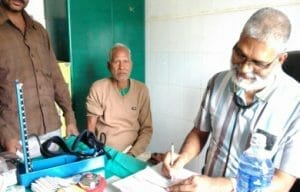
Ayush practitioners and paramedics can both be trained in administering basic medicine and in referral protocols. It is better to have some treatment access to the rural population than to leave them to quacks,” said a ministry source.
Having shelved the proposal of mandatory rural posting for MBBS doctors, the government is planning to create a special cadre of AYUSH practitioners and paramedics for village postings to tide over of shortage of doctors in rural India.
Sources in the Health Ministry say the Medical Council of India (MCI) and the Indian Medical Association (IMA) are both being consulted on the proposal and have been asked to come up with modalities. A ministry official said, “We are in advanced stages of discussions with the MCI and the IMA on the contours of the new proposal. Compulsory rural posting of MBBS doctors is not working out. That plan has been shelved. There is resistance to mandatory rural posting from doctors. So we are talking to the MCI and IMA on alternative solutions. One potential solution is training AYUSH practitioners and paramedics in standard treatment protocols and posting them at rural healthcare settings where shortage of doctors is a huge challenge. The MCI is working on this proposal and the IMA has been consulted. We have told the IMA that if MBBS doctors won’t go to villages to administer medicine, someone will go. We want the IMA on board.”
The move implies legally permitting practitioners of the Indian Systems of Medicine (Ayurveda, Unani, Yoga, Siddha and Homeopathy) to practice allopathy by getting the required permissions from the MCI, medical education regulator.
The proposal envisages development of training modules in integrated medicine for Ayush practitioners and paramedics who can then be posted in villages to enable treatment access to the rural population. The thinking in the ministry is that Ayush practitioners and paramedics can administer basic medicine and do referrals for complicated cases.
“We can fix accountability for referrals and track treatment access to the patient. Ayush practitioners and paramedics can both be trained in administering basic medicine and in referral protocols. It is better to have some treatment access to the rural population than to leave them to quacks,” said a ministry source.
Attempts to legalise allopathic practice by Ayush practitioners have been made in the past too, but have fallen through due to missing MCI approvals for related courses.
Karnataka had in 2013 mooted one such proposal, but the Rajiv Gandhi University of Health Sciences it had handpicked to run an 18-month integrated medicine course for Ayush practitioners backed out citing loopholes. The university had said such a module could not be run unless the MCI approved it.
The MCI is now deliberating on the proposal which the Health Ministry is actively pursuing. Organisations of Ayush practitioners have been already lobbying with the government to get legal permissions to practice integrated medicine and allopathy in the wake of village community health centres facing 81.2% shortage of specialist doctors. The latest rural health statistics of the Health Ministry show that only 751 of India’s 5,369 CHCs have all four specialists mandated under the National Health Mission. Current shortfall at CHC level is — surgeons 83%; obstetricians and gynaecologists 76.3%; physicians 83% and paediatricians 82.1% .
http://www.tribuneindia.com/news/nation/govt-turns-to-ayush-paramedics-to-meet-doctors-shortage-in-villages/141314.html

Better Legal ALLOPATHY Practice for ayush DOCTORS